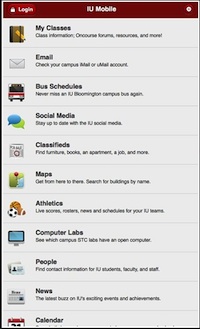Indiana U Switches Mobile Frameworks, Moves to Kuali
- By Dian Schaffhauser
- 08/30/11

Indiana U mobile app built on the Kuali mobile framework |
Following close on the June 2011 launch of a consortium-supported open source platform for campus mobility, Indiana University has replaced the software it uses to deliver information services to mobile devices. Version 2.0 of IU Mobile has been built using Kuali Mobility Enterprise, software created by a consortium of universities and companies.
The new mobile framework used by Indiana U is the product of a Kuali Foundation open source project. Participants also included the University of Cambridge, Cornell, and U Michigan, as well as vendors HTC Global Services and VivanTech.
The Bloomington institution first offered a mobile platform in 2009, built on the open source MIT Mobile Web framework. That initial edition, which catered to mobile Web, included bus schedules, news, events, maps, a people directory, computer labs availability, and a feedback function. The following year Indiana U released a version for Apple's iOS devices, which was followed a few months later by a Google Android release.
The latest edition includes support for "My Classes," a mashup of student data with Sakai's Oncourse, an online collaboration and learning environment. Also, with the new release, each Indiana U campus can tailor its information channels, and all previous IU Mobile services--including athletics scores, class schedules, course content, and bus routes--will be accessible through the new service. The new system will simplify the process that lets users add services to their mobile devices.
The largest technology change in the framework is its support for HTML5. The language includes syntax specifically for adding multimedia components to mobile without the need for third-party plugins, which means sites coded with HTML5 can run audio and video natively. The standard also addresses persistent storage, offline app caching, and geolocation, among other features.
According to Brian McGough, Indiana U's director of enterprise software and project leader, the use of HTML5 means that services can be developed once for all mobile devices, adapting to particular sizes and capabilities. "[The university] can now focus its energy on creating valuable information services, rather than chasing all the new devices."
Any mobile device can access IU Mobile at http://m.iu.edu. Users can also download the app from their specific app store. The new software will also shortly be available for anyone to download at http://kuali.org/mobility.
About the Author
Dian Schaffhauser is a former senior contributing editor for 1105 Media's education publications THE Journal, Campus Technology and Spaces4Learning.